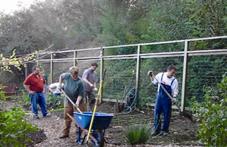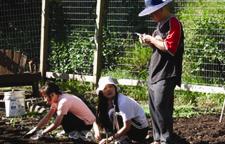|
Page 2 of 3
San Francisco Theological Seminary is located in Marin County about twenty-five minutes north of the Golden Gate Bridge. It is affiliated with the Presbyterian Church USA, one of the mainline denominations. The student body is represented by a slim majority of Presbyterians and is ecumenical because it is part of the consortium The Graduate Theological Union, which has nine different seminaries and several centers and institutes that deal with a variety of denominations and religious perspectives. The student body is ecumenical in its own right also.
 The student body has an international component. International students are in large part from Korea, with Japan, the United Kingdom, Philippines, Vietnam, Ethiopia, China, Indonesia, and Kenya also sending us students, just within the past five years. The international component of the student body is significant for two reasons. The status of pastors and church and denominational leaders tends to be high in the represented countries, relative to their status in the United States; and in the sending countries, the base of the population may be agricultural with high poverty rates. If the class chooses to work in the community garden, some international students experience “status inconsistency,” as the work for the course involves digging in the dirt, but they feel the practice is beneath their station in life or the one to which they aspire. Further, the country of Korea in particular mandates two years of military service from young males and that service tends to include hard labor in agricultural service. For Korean men, work in a garden has its pleasures, but it conjures conversations and images from their time in military service. The American students tend to be urban or suburban, but their grandparents may have lived for at least part of their lives in rural/agricultural areas. These students tend to be pretty far removed from the land. They may have memories of moms, dads, and/or grandparents who required that they help with vegetable gardening, but they are not fond memories. The student body has an international component. International students are in large part from Korea, with Japan, the United Kingdom, Philippines, Vietnam, Ethiopia, China, Indonesia, and Kenya also sending us students, just within the past five years. The international component of the student body is significant for two reasons. The status of pastors and church and denominational leaders tends to be high in the represented countries, relative to their status in the United States; and in the sending countries, the base of the population may be agricultural with high poverty rates. If the class chooses to work in the community garden, some international students experience “status inconsistency,” as the work for the course involves digging in the dirt, but they feel the practice is beneath their station in life or the one to which they aspire. Further, the country of Korea in particular mandates two years of military service from young males and that service tends to include hard labor in agricultural service. For Korean men, work in a garden has its pleasures, but it conjures conversations and images from their time in military service. The American students tend to be urban or suburban, but their grandparents may have lived for at least part of their lives in rural/agricultural areas. These students tend to be pretty far removed from the land. They may have memories of moms, dads, and/or grandparents who required that they help with vegetable gardening, but they are not fond memories.
 These different contexts mean that when the class chooses organic gardening or gardening with native perennials, the reports often include accounts of emotions that surfaced when coming to terms with their military and/or family history. Students from Korea and Africa also report a strict gender assignment of roles related to food production. They need to challenge and adjust to these roles in order to fulfill their assignment, which can generate some anxiety. The very act of telling the class about the gender roles helps everyone know what they are thinking about and what is significant to them in the midst of the dirt. These different contexts mean that when the class chooses organic gardening or gardening with native perennials, the reports often include accounts of emotions that surfaced when coming to terms with their military and/or family history. Students from Korea and Africa also report a strict gender assignment of roles related to food production. They need to challenge and adjust to these roles in order to fulfill their assignment, which can generate some anxiety. The very act of telling the class about the gender roles helps everyone know what they are thinking about and what is significant to them in the midst of the dirt.
A component of the class project is that I, “the teacher,” am working alongside; and physical labor loosens the tongue. Each person becomes more of a person and less of a role in this context, as the setting allows for knowing each other multidimensionally. I am always the teacher, but students may be more accomplished in a specific task and I share the job of problem-solving. More importantly, being out of the classroom makes it likely that each of us has the opportunity to listen to people’s stories about where they’ve been and where they are going. I also get to hear the gossip about my colleagues’ classes.
|
![PDF-NOTE: Internet Explorer Users, right click the PDF Icon and choose [save target as] if you are experiencing problems with clicking.](http://rsnonline.org/templates/rsntemplate-smallmasthead/images/pdf_button.png)



 The student body has an international component. International students are in large part from Korea, with Japan, the United Kingdom, Philippines, Vietnam, Ethiopia, China, Indonesia, and Kenya also sending us students, just within the past five years. The international component of the student body is significant for two reasons. The status of pastors and church and denominational leaders tends to be high in the represented countries, relative to their status in the United States; and in the sending countries, the base of the population may be agricultural with high poverty rates. If the class chooses to work in the community garden, some international students experience “status inconsistency,” as the work for the course involves digging in the dirt, but they feel the practice is beneath their station in life or the one to which they aspire. Further, the country of Korea in particular mandates two years of military service from young males and that service tends to include hard labor in agricultural service. For Korean men, work in a garden has its pleasures, but it conjures conversations and images from their time in military service. The American students tend to be urban or suburban, but their grandparents may have lived for at least part of their lives in rural/agricultural areas. These students tend to be pretty far removed from the land. They may have memories of moms, dads, and/or grandparents who required that they help with vegetable gardening, but they are not fond memories.
The student body has an international component. International students are in large part from Korea, with Japan, the United Kingdom, Philippines, Vietnam, Ethiopia, China, Indonesia, and Kenya also sending us students, just within the past five years. The international component of the student body is significant for two reasons. The status of pastors and church and denominational leaders tends to be high in the represented countries, relative to their status in the United States; and in the sending countries, the base of the population may be agricultural with high poverty rates. If the class chooses to work in the community garden, some international students experience “status inconsistency,” as the work for the course involves digging in the dirt, but they feel the practice is beneath their station in life or the one to which they aspire. Further, the country of Korea in particular mandates two years of military service from young males and that service tends to include hard labor in agricultural service. For Korean men, work in a garden has its pleasures, but it conjures conversations and images from their time in military service. The American students tend to be urban or suburban, but their grandparents may have lived for at least part of their lives in rural/agricultural areas. These students tend to be pretty far removed from the land. They may have memories of moms, dads, and/or grandparents who required that they help with vegetable gardening, but they are not fond memories.  These different contexts mean that when the class chooses organic gardening or gardening with native perennials, the reports often include accounts of emotions that surfaced when coming to terms with their military and/or family history. Students from Korea and Africa also report a strict gender assignment of roles related to food production. They need to challenge and adjust to these roles in order to fulfill their assignment, which can generate some anxiety. The very act of telling the class about the gender roles helps everyone know what they are thinking about and what is significant to them in the midst of the dirt.
These different contexts mean that when the class chooses organic gardening or gardening with native perennials, the reports often include accounts of emotions that surfaced when coming to terms with their military and/or family history. Students from Korea and Africa also report a strict gender assignment of roles related to food production. They need to challenge and adjust to these roles in order to fulfill their assignment, which can generate some anxiety. The very act of telling the class about the gender roles helps everyone know what they are thinking about and what is significant to them in the midst of the dirt.